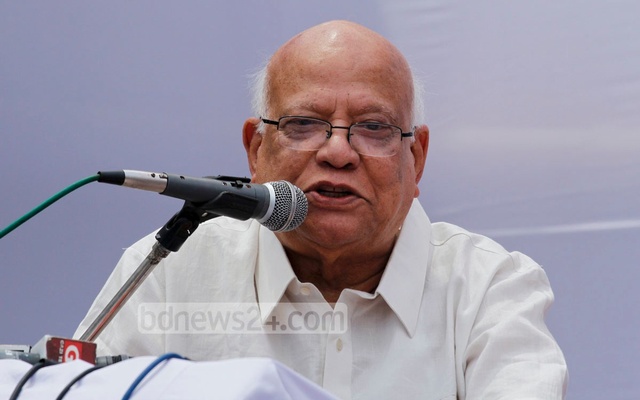
Finance Minister AMA Muhith has said for the first time in nearly two decades, Bangladesh is facing a ‘food crisis’, but the efforts are on to bring down the rice prices.
“But, we are trying to bring it down to Tk 40 per kg,” said the minister.
He made the statement while speaking as chief guest at a discussion on food security at Bangabandhu International Conference Centre on Thursday.
“We took a policy to keep the supply of goods flowing into local markets in 2009 when the recession walloped the world economy. This policy brought us huge success,” he went on.
However, rice prices started soaring in April this year followed by the flash floods in backswamps and other parts of the country. The deluge hit hard the people in the days that followed Eid-ul-Azha celebrations in September.
The retail price of fine rice rose to Tk 70 per kg. Similar price hikes for coarse rice jerked the market.
On Sept 19, ministers held a meeting with rice mill owners, importers, and wholesalers to bring a solution to the crisis. Mill owners agreed to reduce rice prices by Tk 2 to 3 per kg in exchange for the assurances from the government that their demands would be met.
Import of rice from India, Thailand, and Cambodia started after the government relaxed import duties and other conditions. The initiatives curbed prices of coarse rice, but the prices of fine variety of rice remained unchanged.
“The government is handling the crisis with all seriousness,” said Muhith, “Our measures to import rice are helping bring down the prices.”
The minister addressed the policy dialogue titled, ‘Achieving SDGs: Agriculture and Food Security in Bangladesh,’ organised by the International Fund for Agricultural Development or IFAD.
“Our GDP growth had been six percent for a decade, but we could have achieved 7 percent GDP growth in the last three years.”
He hoped that by 2030, no-one in Bangladesh would live below the poverty line.
IFAD has invested $717 million since 1978 in 32 projects in Bangladesh, according to the Economic Relations Division of the ministry. The donations have served 10.7 million families across the country.
IFAD is currently funding six projects aimed at elevating income of poverty-hit population and create sources of income for those coping with effects of climate change.
Source: Bdnews24.

